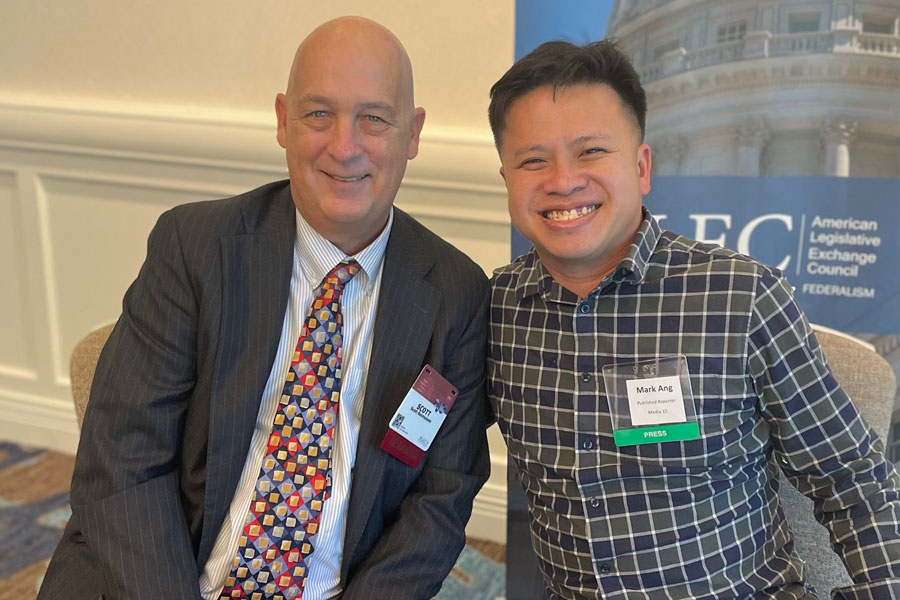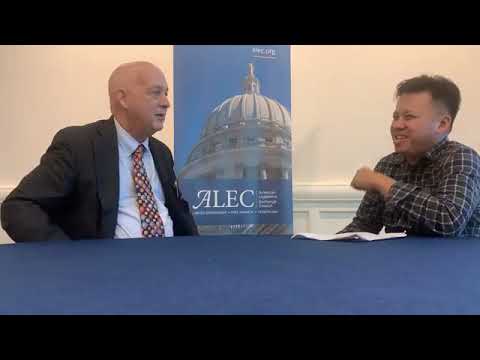
LOS ANGELES, CA – Opinion research polling has been used over the last two decades as fodder for partisan cheerleading and food fights. But the importance of data based decisions rarely gets airplay. I had the privilege of sitting down with top pollster Scott Rasmussen who has nailed every election except 2012.
Here are some highlights from my conversation with Scott.
The State of Polling
“People think polls they agree with are brilliant and polls they disagree with are horrible. There is an overlooked discussion of polls. For a long time, the best way to conduct a poll was through operator-assisted polling, where somebody’s actually calling you. That’s no longer the best way. But companies that did this built reputations on that technology. [Therefore], they don’t want to discuss different methodologies.”
Robocalls & The Evolution of Polling
“Polling is a challenge even in the best of circumstances. Back when I started polling in the late 80s, we thought the biggest technology problem was people screening calls from answering machines. Today, and this wouldn’t have been the case 30 years ago, is rural counties: the smallest counties in America, very heavily pro-Trump and Republican. They’re just harder to reach and more likely to be outside laboring [or performing] different sorts of activities. So we make a special effort to reach those counties. If you don’t, you won’t get those voices. We also made a special effort to reach people without a college degree. Because they take surveys less. [Today,] education and geography [need to be accounted for]”
Removing Operator Assisted Polls From Polling Averages
“If you went to the RealClear average for 2020 and you took out all the operator-assisted polls, which were basically the big media polls, you would find out the average was pretty close. It’s those few polls that really skewed it and they had a big role because they’re done by ABC, Washington Post, etc, so they’re the ones that got all the play. Charlie Cook, the famous prognosticator, talked about a double digit blowout because he was looking at those polls alone. He doesn’t trust anything else.”
Analysis of Polls Needs Work
“I should also point out that if you went back into 2016, you would find out the polling numbers weren’t all that bad. It was the analysis that was bad. On the national popular vote, the average was Hillary by three. She won [the popular vote] by two nationally. The three states that shocked everybody in 2016: Wisconsin, Michigan, Pennsylvania. In Pennsylvania and Michigan, the last polls in those states showed Trump ahead. If people had looked at the numbers they would have seen something. I was at Fox on the morning of the 2016 election. All the discussion was Hillary’s up by three in the polling average. Most people in the room thought she would win by five or six, because they’d say there’s a margin of error. And then a few people were saying she’s gonna win by eight, nine, ten points. Nobody thought about the margin of error going in the other direction.”
Polling Predictions Should Be A Range
“The idea of using a poll with a three point margin of error to pick a one point race is stupid. I went and said, ‘Here’s two different turnout models, one turnout model, a little better for the Democrat, we showed Burgess Owens losing. Another turnout he won.’ I think that’s a more honest way of looking at it, being a little less precise.” About three weeks out, I showed Owens down by four. And by all the media coverage, you would have thought it was getting worse. About a week or a few days before the election, I found him up by one point, and he was gracious enough to win by one.”
People Who Live & Breathe Politics: 10% At Most
“Eight or 10% talk about politics every day, people who live and breathe it. We’re going to have this whole storyline in our minds of the 2022 election, and most voters are just starting to tune in. So when you say, ‘six months ago, do you remember when this happened very recently?’ They just don’t. And by the way, I think it’s healthy that people have more important things to do in their lives.”
To The General Public, Is It A Delayed Response?
“I would say it’s not so much a delayed response, as it’s a response to real world things rather than political things. They eventually seep into the political world every now and then. The Afghanistan withdrawal debacle. Boy, that hit people because it was so embarrassing to leave Americans behind. And that accelerated Biden’s decline, it broke through even if you weren’t a political junkie. It was a story that caught voters’ attention and trust. First of all, we polled right before and after it happened. The numbers shifted.
The Impact of Afghanistan on Joe Biden’s Poll Numbers
“What the event itself did more than the event itself, was it shook the perception of Joe Biden. He was going to be the ‘adults back of the room’. We voted him in for his foreign policy knowledge. Because he wasn’t Trump. I think what will last is the illusion of competence is gone. That will remain and every time something else goes wrong, it will reinforce that.’
Are Texas, Arizona and Georgia Trending Away From Republicans?
“I still think they are leaning [red]. I believe the Democrats have made a terrible miscalculation with Hispanic voters. First of all, the Census Bureau defines a Hispanic person as anybody with any Hispanic heritage. So if your parents were both born in America, but their parents came from a Hispanic country, you’re counting that way? Turns out, about half of Hispanic voters think of themselves as white, especially in West Texas, South Texas. It really depends on if you live in a community which is heavily Hispanic that has strong ties to new immigrants coming in.”
The Fictional Homogenous Coalitions Democrats Peddle
“We’re seeing Democrats want to present is this notion of persons of color, that they are all the same. Everybody is a person of color. That’s just not true. It is not a coalition that exists in the real world. And when you appeal to a Hispanic voter who thinks they’re white, and is trying to make their life in America, and you say you should be fighting for civil rights, but it doesn’t connect in any way, shape, or form.
And what we’ve lost in that narrative is there have always been divisions in America. They’re just divisions we don’t recognize after the 20th century. People from Poland, Italy, Ireland, were not considered white. Jews were not acceptable. If you go back to the 19th century, and actually in much of the 20th, Catholics were not accepted.“
A Post Racial World? Not Just Yet.
“Now, we have a situation where about one out of every five marriages is mixed across racial and ethnic. It’s huge. About 10% of voters plus or minus, can’t claim some kind of ethnic mix. Their heritage is being an American. Statistically, that’s almost true. Not quite there yet. But it’s true to that degree, and it’s not people assimilating into white culture. It’s people assimilating into a mainstream American culture that believes in our founding ideals. The one segment of the population not doing that is still the white community. And there’s an historic issue there that has not been resolved in a way that we know how to deal with. It’s come a long way since the 60s. My grandparents, a Catholic and Episcopalian, got married in 1924. They were disowned by their families for a long time.”
Data-Based Campaigns Are Needed, But Egos Prevent This
“Some clients who I tell them news they don’t want to hear, and they don’t want to talk about it. And within six months or so, they’re not my client anymore. They’re not ‘numbers’ people, they have an emotional reaction. Polling is expensive. People also don’t know how to interpret polls. In 1972, a book called ‘The election game and how to win it’ was written by a guy named Joe Napolitan, who had worked on John Kennedy’s campaign. He was the first person ever called a political consultant to change the world. Every question I asked him, the answer was ‘do a poll’. What he was saying is, ‘it’s not your views that matter, right?’ If you run for city council, because you want to fix things in your neighborhood, the idea of poll testing everything feels wrong. But you can apply that to anything in life. If you want to ask somebody out on a date, you just say whatever you want to say, and hope it works out?
If you’re a pollster, your job is not to give people numbers. It’s to explain it in terms they can understand. It’s hard work because first of all, you have to ask questions to understand the public mood. Then once you’ve done that, you have to think about ‘what does it really mean? What am I getting out of this?’ Then you have to find a way to accurately translate it to a person who may not be comfortable.”
Probe For Nuance, Or Miss Key Opportunities
“Joe Biden gives a speech on vaccine mandates. I polled right afterwards. 54% of voters said they liked it, they supported them. But I also asked how they thought the mandate should be handled. Only 21% said, ‘by the federal government’. A majority said ‘either by companies or by individuals’. People want others to be vaccinated and think vaccination is a good thing. So they kind of like the mandate idea, but are not really sure that’s the right thing. But if it would help the supply chain crisis, we should pull back mandates. Oh, and if it would help firefighters, health care workers and police officers, well, then let’s see.’
You can view the full interview with Scott Rasmussen here.




Comments are closed.